本文列舉了Direct3D中各種紋理應用實現:黑暗貼圖,發光貼圖,漫反射映射貼圖,細節紋理,紋理混合,有較詳盡的注解。其中黑暗貼圖,發光貼圖,細節紋理都是采用多重紋理的方法實現(也可以采用多次渲染混合實現)。
示例代碼使用Beginning direct3D game programming中的框架,省去不少事情,可以專注紋理話題。代碼:
點此下載下面來看代碼與效果:
正常的紋理貼圖效果:
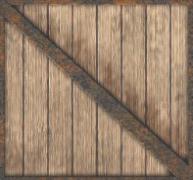
正常的紋理貼圖代碼:
1 //基本紋理
//基本紋理
2 void drawNormalTexture()
void drawNormalTexture()
3

 {
{
4 // 設置box紋理貼圖
// 設置box紋理貼圖
5 Device->SetTexture(0, texBox);
Device->SetTexture(0, texBox);
6 Device->SetTextureStageState(0, D3DTSS_TEXCOORDINDEX, 0); //使用紋理坐標
Device->SetTextureStageState(0, D3DTSS_TEXCOORDINDEX, 0); //使用紋理坐標
7 Device->SetTextureStageState(0, D3DTSS_COLORARG1, D3DTA_TEXTURE); // 顏色來源-材質
Device->SetTextureStageState(0, D3DTSS_COLORARG1, D3DTA_TEXTURE); // 顏色來源-材質
8 Device->SetTextureStageState(0, D3DTSS_COLOROP, D3DTOP_SELECTARG1); // 使用當前顏色作為第一個texture stage的輸出
Device->SetTextureStageState(0, D3DTSS_COLOROP, D3DTOP_SELECTARG1); // 使用當前顏色作為第一個texture stage的輸出
9
10 // 描繪box
// 描繪box
11 Box->draw(0, 0, 0);
Box->draw(0, 0, 0);
12 }
}
黑暗紋理貼圖效果:
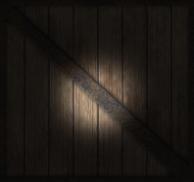
黑暗紋理貼圖代碼:
1 //黑暗映射紋理
//黑暗映射紋理
2 void drawDarkMapTexture()
void drawDarkMapTexture()
3

 {
{
4 // Multi texture:多重紋理,此處為兩重紋理
// Multi texture:多重紋理,此處為兩重紋理
5 // finalColor = destPixelColor * sourcePixelColor
// finalColor = destPixelColor * sourcePixelColor
6 // 設置box紋理貼圖
// 設置box紋理貼圖
7 Device->SetTexture(0, texBox);
Device->SetTexture(0, texBox);
8 Device->SetTextureStageState(0, D3DTSS_TEXCOORDINDEX, 0);
Device->SetTextureStageState(0, D3DTSS_TEXCOORDINDEX, 0);
9 Device->SetTextureStageState(0, D3DTSS_COLORARG1, D3DTA_TEXTURE); // 顏色來源-材質
Device->SetTextureStageState(0, D3DTSS_COLORARG1, D3DTA_TEXTURE); // 顏色來源-材質
10 Device->SetTextureStageState(0, D3DTSS_COLOROP, D3DTOP_SELECTARG1); // 使用當前顏色作為第一個texture stage的輸出
Device->SetTextureStageState(0, D3DTSS_COLOROP, D3DTOP_SELECTARG1); // 使用當前顏色作為第一個texture stage的輸出
11
12 // 設置黑暗紋理貼圖
// 設置黑暗紋理貼圖
13 Device->SetTexture(1, texAlpha);
Device->SetTexture(1, texAlpha);
14 Device->SetTextureStageState(1, D3DTSS_TEXCOORDINDEX, 0);
Device->SetTextureStageState(1, D3DTSS_TEXCOORDINDEX, 0);
15 Device->SetTextureStageState(1, D3DTSS_COLORARG1, D3DTA_TEXTURE); // 顏色來源-材質
Device->SetTextureStageState(1, D3DTSS_COLORARG1, D3DTA_TEXTURE); // 顏色來源-材質
16 Device->SetTextureStageState(1, D3DTSS_COLORARG2, D3DTA_CURRENT); // 顏色來源-前一個texture stage
Device->SetTextureStageState(1, D3DTSS_COLORARG2, D3DTA_CURRENT); // 顏色來源-前一個texture stage
17 Device->SetTextureStageState(1, D3DTSS_COLOROP, D3DTOP_MODULATE); // 顏色混合:相乘
Device->SetTextureStageState(1, D3DTSS_COLOROP, D3DTOP_MODULATE); // 顏色混合:相乘
18
19 // 描繪box
// 描繪box
20 Box->draw(0, 0, 0);
Box->draw(0, 0, 0);
21 }
}
漫反射映射貼圖效果:夜光鏡效果
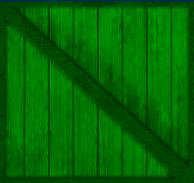
漫反射映射貼圖代碼:
1 //漫射光映射紋理
//漫射光映射紋理
2 void drawDiffuseTexture()
void drawDiffuseTexture()
3

 {
{
4 // 設置box紋理貼圖
// 設置box紋理貼圖
5 Device->SetTexture(0, texBox);
Device->SetTexture(0, texBox);
6 Device->SetTextureStageState(0, D3DTSS_TEXCOORDINDEX, 0);
Device->SetTextureStageState(0, D3DTSS_TEXCOORDINDEX, 0);
7 Device->SetTextureStageState(0, D3DTSS_COLORARG1, D3DTA_TEXTURE); // 顏色來源-材質
Device->SetTextureStageState(0, D3DTSS_COLORARG1, D3DTA_TEXTURE); // 顏色來源-材質
8 Device->SetTextureStageState(0, D3DTSS_COLORARG2, D3DTA_DIFFUSE); // 顏色來源-漫反射
Device->SetTextureStageState(0, D3DTSS_COLORARG2, D3DTA_DIFFUSE); // 顏色來源-漫反射
9 Device->SetTextureStageState(0, D3DTSS_COLOROP, D3DTOP_MODULATE); // 顏色混合
Device->SetTextureStageState(0, D3DTSS_COLOROP, D3DTOP_MODULATE); // 顏色混合
10
11 // 設置材質:綠色材質實現類似夜光鏡的效果
// 設置材質:綠色材質實現類似夜光鏡的效果
12 Device->SetMaterial(&d3d::GREEN_MTRL);
Device->SetMaterial(&d3d::GREEN_MTRL);
13
14 // 描繪box
// 描繪box
15 Box->draw(0, 0, 0);
Box->draw(0, 0, 0);
16 }
}
發光映射紋理貼圖效果:
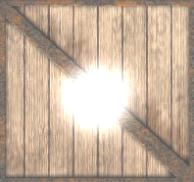
發光映射紋理貼圖代碼:
1 //發光映射紋理
//發光映射紋理
2 void drawGlowMapTexture()
void drawGlowMapTexture()
3

 {
{
4 // Multi texture:多重紋理,此處為兩重紋理
// Multi texture:多重紋理,此處為兩重紋理
5 // finalColor = sourcePixelColor * 1.0 + destPixelColor * 1.0
// finalColor = sourcePixelColor * 1.0 + destPixelColor * 1.0
6 // 設置box紋理貼圖
// 設置box紋理貼圖
7 Device->SetTexture(0, texBox);
Device->SetTexture(0, texBox);
8 Device->SetTextureStageState(0, D3DTSS_TEXCOORDINDEX, 0);
Device->SetTextureStageState(0, D3DTSS_TEXCOORDINDEX, 0);
9 Device->SetTextureStageState(0, D3DTSS_COLORARG1, D3DTA_TEXTURE); // 顏色來源-材質
Device->SetTextureStageState(0, D3DTSS_COLORARG1, D3DTA_TEXTURE); // 顏色來源-材質
10 Device->SetTextureStageState(0, D3DTSS_COLOROP, D3DTOP_SELECTARG1); // 使用當前顏色作為第一個texture stage的輸出
Device->SetTextureStageState(0, D3DTSS_COLOROP, D3DTOP_SELECTARG1); // 使用當前顏色作為第一個texture stage的輸出
11
12 // 設置黑暗紋理貼圖
// 設置黑暗紋理貼圖
13 Device->SetTexture(1, texAlpha);
Device->SetTexture(1, texAlpha);
14 Device->SetTextureStageState(1, D3DTSS_TEXCOORDINDEX, 0);
Device->SetTextureStageState(1, D3DTSS_TEXCOORDINDEX, 0);
15 Device->SetTextureStageState(1, D3DTSS_COLORARG1, D3DTA_TEXTURE); // 顏色來源-材質
Device->SetTextureStageState(1, D3DTSS_COLORARG1, D3DTA_TEXTURE); // 顏色來源-材質
16 Device->SetTextureStageState(1, D3DTSS_COLORARG2, D3DTA_CURRENT); // 顏色來源-前一個texture stage
Device->SetTextureStageState(1, D3DTSS_COLORARG2, D3DTA_CURRENT); // 顏色來源-前一個texture stage
17 Device->SetTextureStageState(1, D3DTSS_COLOROP, D3DTOP_ADD); // 顏色混合:相加
Device->SetTextureStageState(1, D3DTSS_COLOROP, D3DTOP_ADD); // 顏色混合:相加
18
19 // 描繪box
// 描繪box
20 Box->draw(0, 0, 0);
Box->draw(0, 0, 0);
21 }
}
細節映射紋理貼圖:實現粗糙的凹凸效果
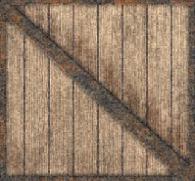
細節映射紋理貼圖代碼:
1 //細節映射紋理:實現凹凸效果
//細節映射紋理:實現凹凸效果
2 void drawDetailMapTexture()
void drawDetailMapTexture()
3

 {
{
4 // Multi texture:多重紋理,此處為兩重紋理
// Multi texture:多重紋理,此處為兩重紋理
5 // finalColor = sourcePixelColor * destPixelColor + destPixelColor * sourcePixelColor
// finalColor = sourcePixelColor * destPixelColor + destPixelColor * sourcePixelColor
6 // 設置box紋理貼圖
// 設置box紋理貼圖
7 Device->SetTexture(0, texBox);
Device->SetTexture(0, texBox);
8 Device->SetTextureStageState(0, D3DTSS_TEXCOORDINDEX, 0);
Device->SetTextureStageState(0, D3DTSS_TEXCOORDINDEX, 0);
9 Device->SetTextureStageState(0, D3DTSS_COLORARG1, D3DTA_TEXTURE); // 顏色來源-材質
Device->SetTextureStageState(0, D3DTSS_COLORARG1, D3DTA_TEXTURE); // 顏色來源-材質
10 Device->SetTextureStageState(0, D3DTSS_COLOROP, D3DTOP_SELECTARG1); // 使用當前顏色作為第一個texture stage的輸出
Device->SetTextureStageState(0, D3DTSS_COLOROP, D3DTOP_SELECTARG1); // 使用當前顏色作為第一個texture stage的輸出
11
12 // 設置細節紋理貼圖
// 設置細節紋理貼圖
13 Device->SetTexture(1, texDetail);
Device->SetTexture(1, texDetail);
14 Device->SetTextureStageState(1, D3DTSS_TEXCOORDINDEX, 0);
Device->SetTextureStageState(1, D3DTSS_TEXCOORDINDEX, 0);
15 Device->SetTextureStageState(1, D3DTSS_COLORARG1, D3DTA_TEXTURE); // 顏色來源-材質
Device->SetTextureStageState(1, D3DTSS_COLORARG1, D3DTA_TEXTURE); // 顏色來源-材質
16 Device->SetTextureStageState(1, D3DTSS_COLORARG2, D3DTA_CURRENT); // 顏色來源-前一個渲染通道
Device->SetTextureStageState(1, D3DTSS_COLORARG2, D3DTA_CURRENT); // 顏色來源-前一個渲染通道
17 Device->SetTextureStageState(1, D3DTSS_COLOROP, D3DTOP_ADDSIGNED); // 顏色混合
Device->SetTextureStageState(1, D3DTSS_COLOROP, D3DTOP_ADDSIGNED); // 顏色混合
18
19 // 描繪box
// 描繪box
20 Box->draw(0, 0, 0);
Box->draw(0, 0, 0);
21 }
}
alpha紋理混合效果:多次渲染實現
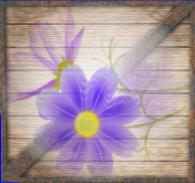
alph紋理混合代碼:
1 //alpha混合紋理
//alpha混合紋理
2 void drawAlphaBlendTexture()
void drawAlphaBlendTexture()
3

 {
{
4 // 多次渲染實現紋理混合
// 多次渲染實現紋理混合
5 // finalColor = sourcePixelColor * sourceBlendFactor + destPixelColor * destBlendFactor
// finalColor = sourcePixelColor * sourceBlendFactor + destPixelColor * destBlendFactor
6 // 設置紋理混合參數
// 設置紋理混合參數
7 Device->SetTextureStageState(0, D3DTSS_ALPHAARG1, D3DTA_TEXTURE); // alpha值來自紋理
Device->SetTextureStageState(0, D3DTSS_ALPHAARG1, D3DTA_TEXTURE); // alpha值來自紋理
8 Device->SetTextureStageState(0, D3DTSS_ALPHAOP, D3DTOP_SELECTARG1);
Device->SetTextureStageState(0, D3DTSS_ALPHAOP, D3DTOP_SELECTARG1);
9
10 // 設置混合因子實現透明效果
// 設置混合因子實現透明效果
11 Device->SetRenderState(D3DRS_SRCBLEND, D3DBLEND_SRCALPHA);
Device->SetRenderState(D3DRS_SRCBLEND, D3DBLEND_SRCALPHA);
12 Device->SetRenderState(D3DRS_DESTBLEND, D3DBLEND_INVSRCALPHA);
Device->SetRenderState(D3DRS_DESTBLEND, D3DBLEND_INVSRCALPHA);
13
14 //使用box紋理貼圖實現第一次渲染,無alpha混合
//使用box紋理貼圖實現第一次渲染,無alpha混合
15 Device->SetTexture(0, texBox);
Device->SetTexture(0, texBox);
16 Device->SetTextureStageState(0, D3DTSS_TEXCOORDINDEX, 0);
Device->SetTextureStageState(0, D3DTSS_TEXCOORDINDEX, 0);
17 Device->SetTextureStageState(0, D3DTSS_COLORARG1, D3DTA_TEXTURE); // 顏色來源-材質
Device->SetTextureStageState(0, D3DTSS_COLORARG1, D3DTA_TEXTURE); // 顏色來源-材質
18 Device->SetTextureStageState(0, D3DTSS_COLOROP, D3DTOP_SELECTARG1); // 使用當前顏色作為第一個texture stage的輸出
Device->SetTextureStageState(0, D3DTSS_COLOROP, D3DTOP_SELECTARG1); // 使用當前顏色作為第一個texture stage的輸出
19
20 // 第一次描繪box
// 第一次描繪box
21 Box->draw(&boxWorldMatrix, 0, 0);
Box->draw(&boxWorldMatrix, 0, 0);
22
23 //使用帶alpha值得flower紋理貼圖實現第二次渲染,有alpha混合
//使用帶alpha值得flower紋理貼圖實現第二次渲染,有alpha混合
24 Device->SetTexture(0, texAlphaFlower);
Device->SetTexture(0, texAlphaFlower);
25 Device->SetTextureStageState(0, D3DTSS_TEXCOORDINDEX, 0);
Device->SetTextureStageState(0, D3DTSS_TEXCOORDINDEX, 0);
26 Device->SetTextureStageState(0, D3DTSS_COLORARG1, D3DTA_TEXTURE); // 顏色來源-材質
Device->SetTextureStageState(0, D3DTSS_COLORARG1, D3DTA_TEXTURE); // 顏色來源-材質
27 Device->SetTextureStageState(0, D3DTSS_COLOROP, D3DTOP_SELECTARG1); // 使用當前顏色作為第一個texture stage的輸出
Device->SetTextureStageState(0, D3DTSS_COLOROP, D3DTOP_SELECTARG1); // 使用當前顏色作為第一個texture stage的輸出
28
29 // 打開紋理混合
// 打開紋理混合
30 Device->SetRenderState(D3DRS_ALPHABLENDENABLE, true);
Device->SetRenderState(D3DRS_ALPHABLENDENABLE, true);
31
32 // 第一次描繪box
// 第一次描繪box
33 Box->draw(&boxWorldMatrix, 0, 0);
Box->draw(&boxWorldMatrix, 0, 0);
34
35 // 關閉紋理混合
// 關閉紋理混合
36 Device->SetRenderState(D3DRS_ALPHABLENDENABLE, false);
Device->SetRenderState(D3DRS_ALPHABLENDENABLE, false);
37 }
}